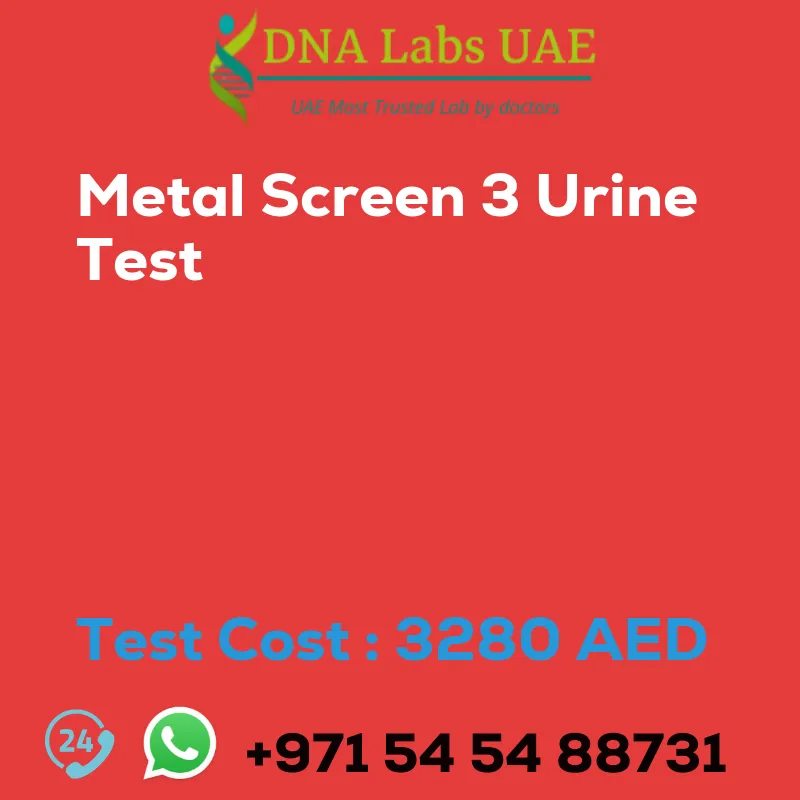METAL SCREEN 3 URINE Test
Test Name: METAL SCREEN 3 URINE Test
Components: Arsenic, Cadmium, Chromium, Cobalt, Lead, Manganese, Thalium, Copper, Zinc, Selenium, Nickel, Mercury
Price: 3280.0 AED
Sample Condition: 10 mL (5 mL min.) aliquot of 24-hour urine collected in an acid washed (metal free) container kit available from LPL. Mix thoroughly. Transfer 10 mL aliquot to vial provided in kit. Measure 24-hour total volume and record on vial and Test request form. Patient should avoid eating seafood, herbal supplements, mineral supplements, vitamin B12 or vitamin B complex, sea/freshwater fish for at least 3 days prior to specimen collection. Ship refrigerated or frozen. Use powderless gloves during specimen collection.
Report Delivery: Sample Daily by 6 pm; Report Next day
Method: ICPMS
Test Type: Industrial Disease
Doctor: Physician
Test Department:
Pre Test Information: Patient should avoid eating seafood, herbal supplements, mineral supplements, vitamin B12 or vitamin B complex, sea/freshwater fish for at least 3 days prior to specimen collection. If Gadolinium or Iodine containing contrast media has been administered, the specimen should not be collected for 96 hours.
Test Details:
Metal screen urine test is a type of laboratory test used to detect the presence of heavy metals in a person’s urine. Heavy metals such as lead, mercury, arsenic, cadmium, and nickel can be toxic to the body and can accumulate over time, leading to various health problems. The test involves collecting a urine sample from the individual and analyzing it for the presence of heavy metals. This is typically done using specialized equipment and techniques in a laboratory setting.
The metal screen urine test can be useful in assessing occupational exposure to heavy metals, evaluating potential poisoning cases, and monitoring the effectiveness of treatment for heavy metal toxicity. It can also be used as a preventive measure to identify individuals at risk of heavy metal exposure.
It is important to note that the metal screen urine test is not a routine test and is typically ordered by a healthcare professional based on specific symptoms or concerns. The results of the test can help guide further medical evaluation and treatment if necessary.
If you suspect heavy metal exposure or toxicity, it is important to consult with a healthcare professional who can determine if a metal screen urine test is necessary and provide appropriate guidance and treatment.
| Test Name | METAL SCREEN 3 URINE Test |
|---|---|
| Components | *Arsenic*Cadmium*Chromium*Cobalt *Lead *Manganese*Thalium*Copper*Zinc*Selenium*Nickel*Mercury |
| Price | 3280.0 AED |
| Sample Condition | 10 mL (5 mL min.) aliquot of 24 hour urine collected in an acid washed (metal free) container kit available from LPL. Mix thoroughly. Transfer 10 mL aliquot to vial provided in kit. Measure 24 hour total volume and record on vial and Test request form. Patient should avoideating seafood, herbal supplements, mineral supplements, vitamin B12 or vitamin B complex, sea\/fresh water fish for atleast 3 days prior to specimen collection.Ship refrigerated or frozen. Use powderless gloves during specimen collection. |
| Report Delivery | Sample Daily by 6 pm; Report Next day |
| Method | ICPMS |
| Test type | Industrial disease |
| Doctor | Physician |
| Test Department: | |
| Pre Test Information | Patient should avoideating seafood, herbal supplements, mineral supplements, vitamin B12 or vitamin B complex, sea/fresh water fish for atleast 3 days prior to specimen collection. If Gadolinium or Iodine containing contrast media has been administered, the specimen should not be collected for 96 hours. |
| Test Details |
Metal screen urine test is a type of laboratory test used to detect the presence of heavy metals in a person’s urine. Heavy metals such as lead, mercury, arsenic, cadmium, and nickel can be toxic to the body and can accumulate over time, leading to various health problems. The test involves collecting a urine sample from the individual and analyzing it for the presence of heavy metals. This is typically done using specialized equipment and techniques in a laboratory setting. The metal screen urine test can be useful in assessing occupational exposure to heavy metals, evaluating potential poisoning cases, and monitoring the effectiveness of treatment for heavy metal toxicity. It can also be used as a preventive measure to identify individuals at risk of heavy metal exposure. It is important to note that the metal screen urine test is not a routine test and is typically ordered by a healthcare professional based on specific symptoms or concerns. The results of the test can help guide further medical evaluation and treatment if necessary. If you suspect heavy metal exposure or toxicity, it is important to consult with a healthcare professional who can determine if a metal screen urine test is necessary and provide appropriate guidance and treatment. |








